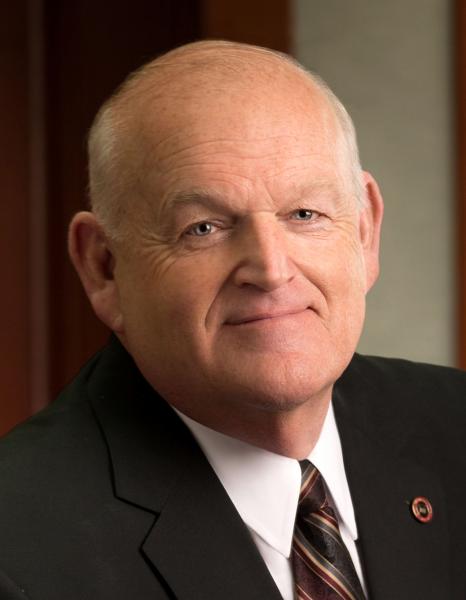Gaudino gives his final State of the University speech
October 24, 2020
In his final State of the University speech as President of CWU, James L. Gaudino outlined the progress the university has made towards meeting his three university-wide goals, while also previewing the university’s future.
This speech was Gaudino’s last State of the University address, as he has previously announced that he plans to step down as president on July 31, 2021 and anticipates that a successor could be named as early as winter quarter.
Due to the COVID-19 pandemic, this year’s address was delivered virtually at 10 a.m. on Oct. 21 with each speaker in the speech filmed at different times in a studio, in contrast to the in-person speech held in previous years.
Gaudino’s goals addressed at the speech were to increase the student retention rate between freshman and sophomore year to 80%, to increase the number of diverse faculty by 5% and reduce the campus’s carbon footprint of the university by 5%, all by 2024.
Increasing Retention Rate
Gaudino said CWU remains on track to increase the retention rate to 80% by 2024 and to set a more ambitious goal of increasing the retention rate to 85% over the next 10 years. Last year CWU increased its retention rate from 71% to 73%, and Gaudino said even with the pandemic CWU has enrolled its largest sophomore class in the last 10 years.
To reach the goal of 85%, Gaudino said the university would use analytics to help predict when a student needs help, and will guide the student towards the proper resources. CWU has been working on these analytics over the past five years.
“It will be equally important not to objectify student achievement into numbers or trend lines. Doing so would mask the very reason this goal is so crucial,” Gaudino said. “Persistence is a behavioral concept based on the needs of individuals. No trend line can capture those realities.”
Increasing the Diversity Rate Among Faculty
Gaudino said CWU also remains on track to meet this goal, and said it’s important to have a diverse faculty since roughly 40% of CWU students this year identify as a racial or ethnic minority. So far the university has increased diversity among its faculty by 1.5% since last year.
For the sixth time in seven years, CWU won Insight into Diversity magazine’s Higher Education Excellence in Diversity Award, and Gaudino said this honored CWU for “[CWU’s] commitment to broadening diversity and inclusion on campus.”
Among new policies CWU has implemented, an employee of color is on all search committees and has developed a mentor program “to support employees of color.” CWU is also reviewing the demographics of its hiring pools.
Gaudino said these efforts are working.
“Geology was one of the first academic departments to use a diversity advocate for their [hiring] searches,” Gaudino said. “As a result, the candidate pool saw increased diversity throughout the search process. The department was able to hire a person from a traditionally underrepresented group.”
Decrease Carbon Footprint
The university also appears to be taking steps toward reaching this goal. The first step the university took towards decreasing its carbon footprint was hiring Kathleen Klaniecki as CWU’s sustainability coordinator.
“[Klaniecki] wasted no time in developing a comprehensive sustainability plan that includes benchmarks and goals,” Gaudino said.
Among the steps CWU has taken to further this goal are expanding the Wildcat Neighborhood Farm and introducing honey bees, implementing NoTrees products throughout campus dining services alongside reusable plates and cups to the Holmes dining room, and Wildcat Printing replacing copier paper with a product made from sugar cane.
In February, CWU’s Ellensburg campus received a Tree Campus USA designation from the Arbor Day Foundation.
“The designation acknowledges the university’s efforts to manage trees on campus and to develop community connections,” Gaudino said.
The University has also formed a Council on Investor Responsibility that will suggest investment opportunities that are “socially and environmentally responsible,” Gaudino said.
Faculty and Alumni Honored
During the speech, Gaudino recognized several alumni for “distinction in their professional and personal lives.” Former Deputy Secretary U.S. Department of Housing and Urban Development Ron Sims, as well as former United States Secretary of Defense James Mattis, were among those to be awarded an honorary doctorate during the speech.
Bobby Cummings, a professor in the Africana and Black Studies department as well as the English Department, received CWU’s inaugural Lifetime Achievement in Diversity Award. Gaudino said the award was created to recognize Cumming’s work on campus, and that he hopes others will strive to receive the recognition in the future.
“Dr. Cummings is a forceful and effective advocate for others, often at her own personal and professional expense,” Gaudino said. “She cares deeply about colleagues and students, and she has a passionate commitment to inclusivity, multiculturalism, and diversity.”
Upon announcing the award, Gaudino also announced the award would be subsequently renamed in Cumming’s honor for future recipients.



